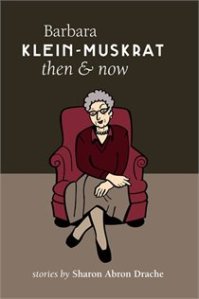 For some time, I’ve been bored with much of the lacklustre fiction that I come across in literary journals. While technically and formally accomplished, too many stories feel bland and generic, scrubbed clean of either energetic language or the grit and specificity of real life. Worse (and I can implicate myself here!), almost no literary fiction laughs at anything.
For some time, I’ve been bored with much of the lacklustre fiction that I come across in literary journals. While technically and formally accomplished, too many stories feel bland and generic, scrubbed clean of either energetic language or the grit and specificity of real life. Worse (and I can implicate myself here!), almost no literary fiction laughs at anything.
Now I wouldn’t bother complaining about this unless I’d found an antidote, and I have. It’s Sharon Abron Drache’s new pseudo-memoir, and even the title is funny. For those old enough to remember the wave of Canadian cultural nationalism in the Seventies, Barbara Klein-Muskrat Then And Now will echo not only Mordechai Richler’s wit but a weird cultural pretentiousness which Drache skewers throughout the book. The narrator of these linked tales, a literary critic of some substance, has changed her married name — Muskovitch — to Muskrat, in an apparent (but unspoken) effort to elevate a homely ethnic name to an even more homely — but more status-laden — Canadian moniker. And that’s only for starters.
The fictitious tales cover thirty years in the life of this prominent critic and fiction writer who grew up in Toronto, then moved with her (now) ex-husband to Ottawa. Specifics? City streets and hangouts of the well-heeled and wannabes are everywhere. It’s fun to travel through Drache’s personal Mapquest of both Toronto and Ottawa; more so if you’ve lived in or spent much time in either city. Names are named in Klein-Muskrat’s menagerie: Richler; former McClelland and Stewart publisher Jack McClelland; former Globe and Mail book review editor Jack Kapica all make guest appearances, along with a coterie of mildly irritating (but witty) relatives. Barbara’s mother, awash in the budgetary details of her upcoming fiftieth wedding anniversary celebration, would like the grandsons to bring dates. When Barbara notes that her son Michael is only fourteen and also gay, mama snaps: “So let him start early to find a nice Jewish boy,” ranting that this state of affairs would be a great improvement over Michael’s big brother and his shiksa girlfriend.
Readers will list their own favourites from a collection peppered with wisecracks, but for rampant (and truly funny) political incorrectness, my personal pick is the epistolary segment, “Dear Benjy.” Maybe it’s the state of the world right now that knocked the breath out of me as Barbara unfolds her tale of woe to her brother, who just happens to live on a kibbutz in the Golan Heights, in Israel in 1989 (on what is now the hyper-dangerous Syrian border). If that weren’t enough free-association for today’s reader, poor Benjy’s lost his wife to a real estate agent visiting the kibbutz from Florida, allowing Barbara to describe how her own husband Ian ran off with his boss and her good friend, accordion-playing Yolande, “the (gasp!) first half-Native person to rise to the highest echelon in Canada’s civil service.” The other half of Yolande turns out to have been Jewish. Yet it’s not only the unravelling of her ethnicity that’s so very funny; it’s the tossed salad of oddball tidbits spiked with whoa-this-letter’s-going-to-the-Middle-East that sends it over the top.
Drache’s writing is crisp and wry and chuckle-generating throughout, and its use of detail makes both Jewish-Canadian and literary culture entertaining and absolutely real. For better or for worse, it’s also worth noting that she’s recreated a vanished moment in Canadian history, evoking aspects of a literary and publishing world that no longer exists (The time when one could pick up the phone and connect with Canada’s foremost book publisher — or even with his personal answering machine — is long gone, if not unimaginable). Even so, her humour brings an entire world (and subculture) to life, and may yet encourage the rest of us to lighten up a bit.
Barbara Klein-Muskrat Then and Now by Sharon Abron Drache is published by Inanna Publications (Toronto: 2012).

